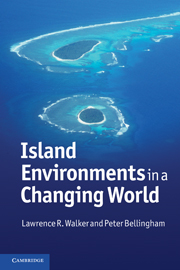Book contents
- Frontmatter
- Contents
- Preface
- Photo credits
- 1 Introduction to island environments and cultures
- 2 The physical setting
- 3 Natural disturbances on islands
- 4 The plants and animals of islands
- 5 Human dispersal, colonization, and early environmental impacts
- 6 Intensifying human impacts on islands
- 7 Islands in the modern world, 1950–2000
- 8 The future of island ecosystems: remoteness lost
- Glossary
- Index
- Plate section
- References
6 - Intensifying human impacts on islands
Published online by Cambridge University Press: 05 June 2012
- Frontmatter
- Contents
- Preface
- Photo credits
- 1 Introduction to island environments and cultures
- 2 The physical setting
- 3 Natural disturbances on islands
- 4 The plants and animals of islands
- 5 Human dispersal, colonization, and early environmental impacts
- 6 Intensifying human impacts on islands
- 7 Islands in the modern world, 1950–2000
- 8 The future of island ecosystems: remoteness lost
- Glossary
- Index
- Plate section
- References
Summary
INTRODUCTION
In this chapter, we follow the development of human civilizations across the nine island groups until modern times. We address the changing relationship of civilizations on the islands with their environments. In Chapter 5, we described the first civilizations that developed on the islands after their initial settlement, but, for many of the islands, new waves of settlers arrived later. Often there were violent clashes between the residents and the later settlers and major changes in island environments were brought about by new settlers. It is beyond the scope of our book to record in detail the human histories of each of the island groups: entire libraries are devoted to the histories of the British Isles and Japan alone. Our intention is to highlight common trends across the island groups.
On settlement of an island, people first required that the finite resources of an island were sufficient to meet the basic human needs of food and shelter. If these needs could be met, civilizations developed. Populations have grown on some of the islands that we consider, sometimes to quite extraordinary densities, but there are consequences of such growth for the island environments. Agricultural societies developed from the hunter-gatherer civilizations that preceded them in the British Isles and the main islands of Japan, and this may also have been the case in Puerto Rico.
- Type
- Chapter
- Information
- Island Environments in a Changing World , pp. 182 - 234Publisher: Cambridge University PressPrint publication year: 2011



